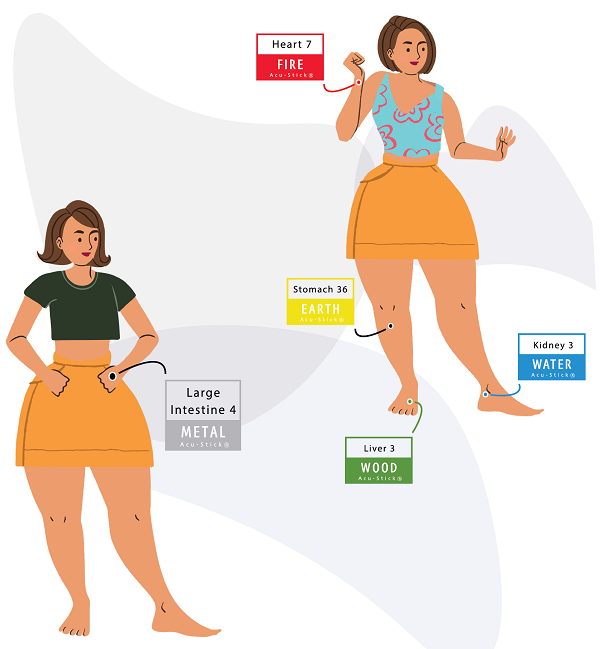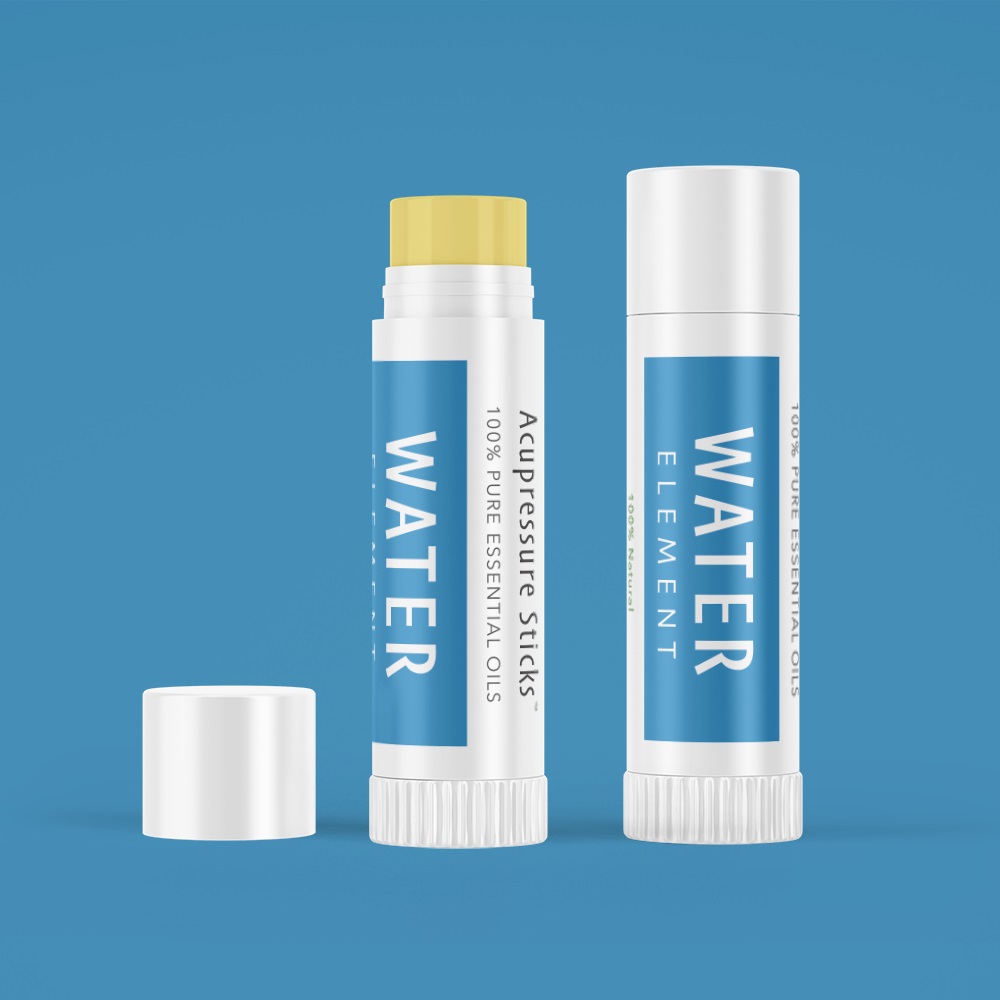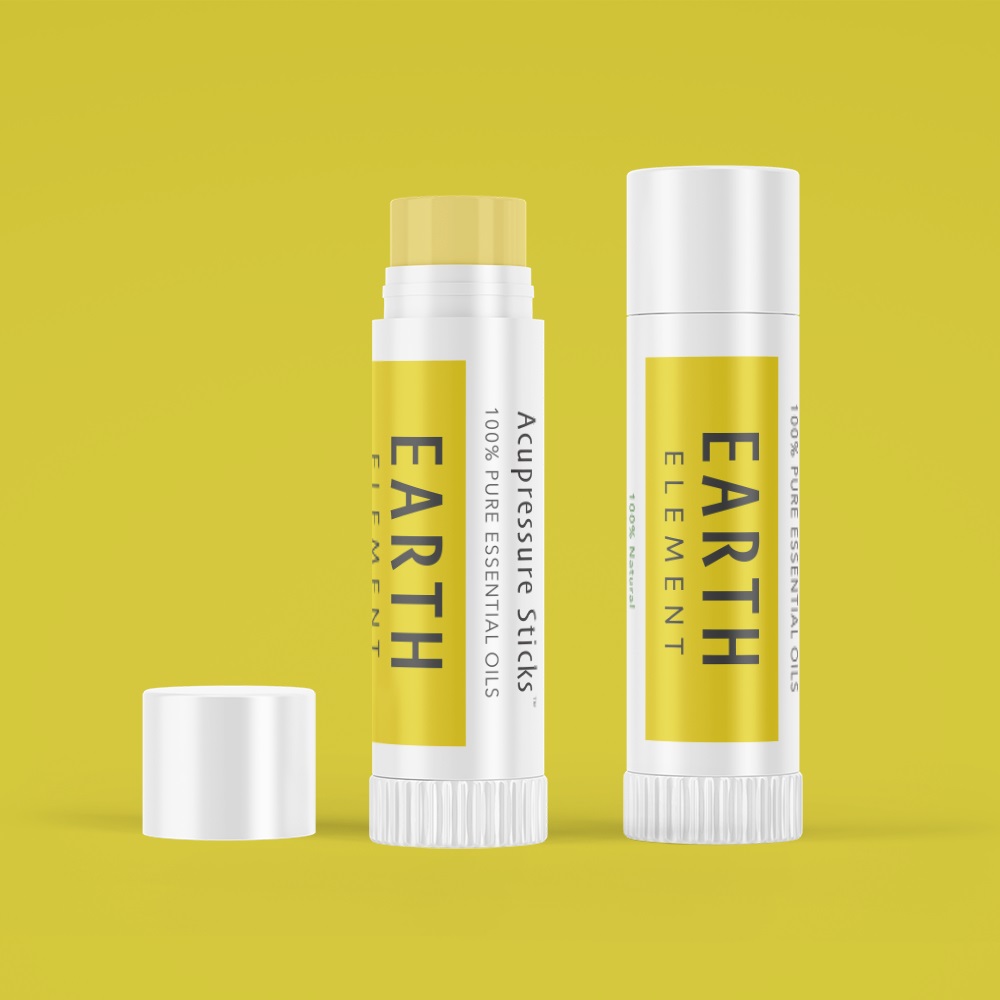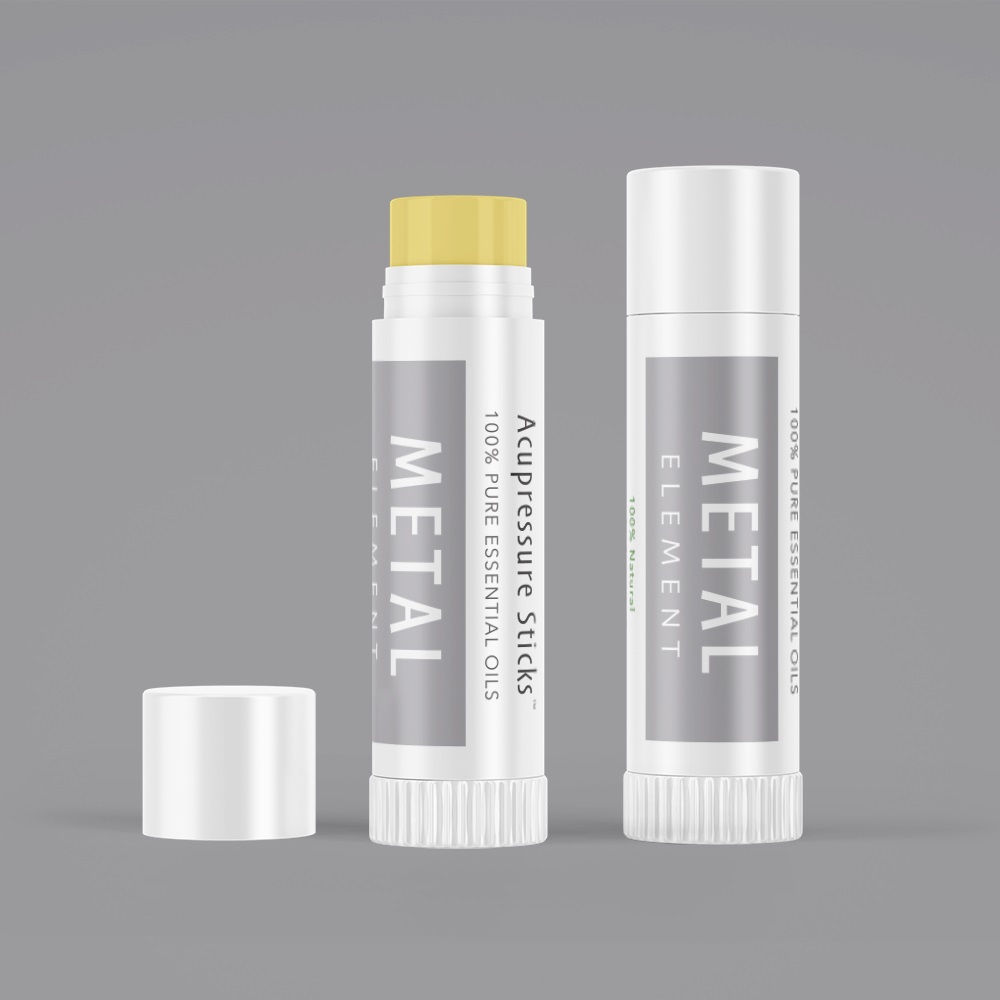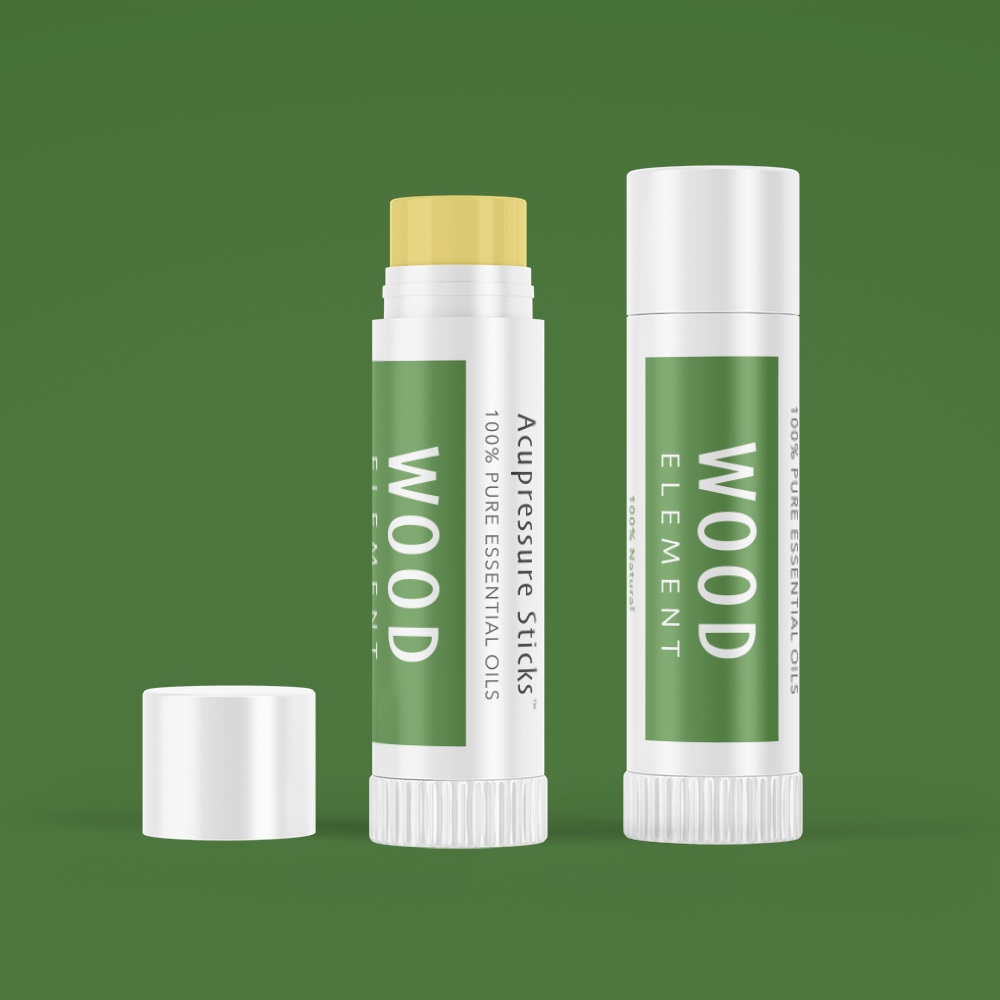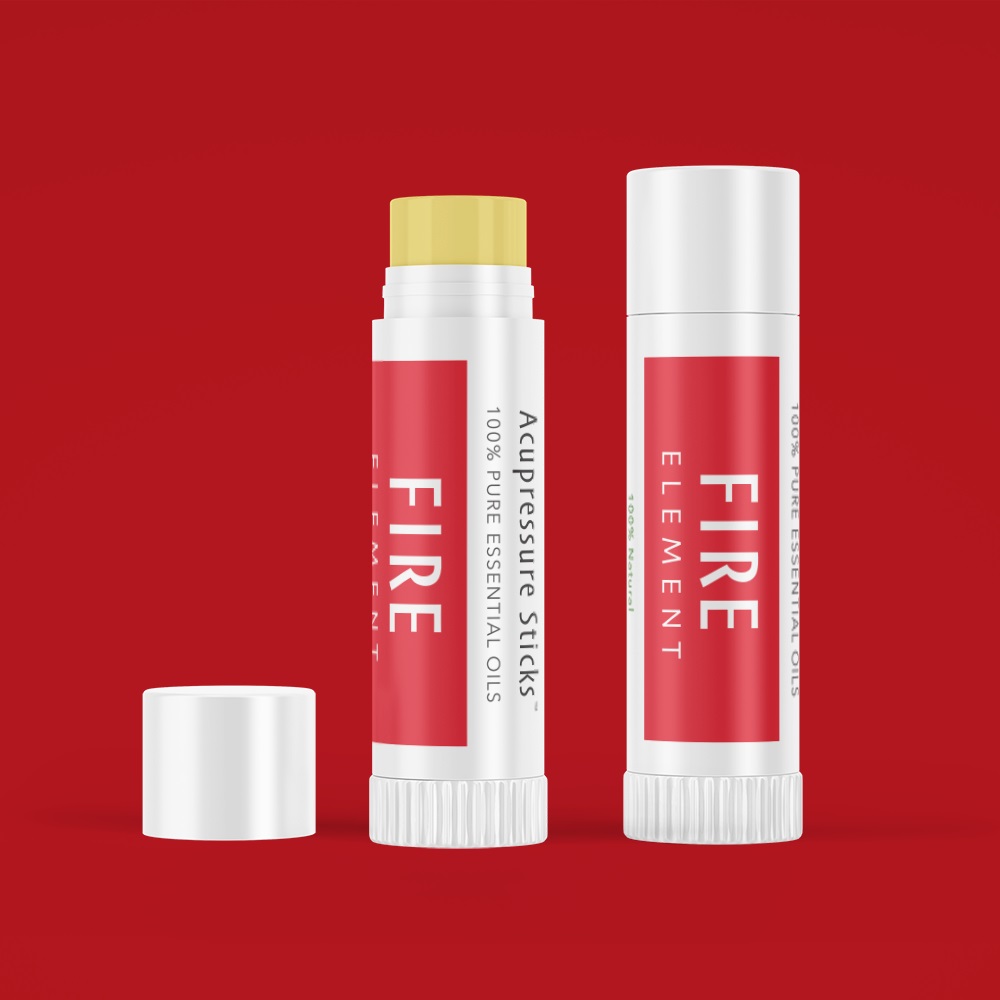Emotional Health
Emotional Health and Traditional Chinese Medicine
 For thousands of years, Traditional Chinese Medicine (TCM) has linked emotional health to physical health; these ancient theories dictate that you cannot separate one from the other.
For thousands of years, Traditional Chinese Medicine (TCM) has linked emotional health to physical health; these ancient theories dictate that you cannot separate one from the other.
Much of traditional Chinese medicine is modeled on The Tao; this is an ancient text that translates as “The Way” which reveals good lifestyle practices to achieve a long and healthy life. The goal is to attained harmony through practices that promote both physical and emotional wellness. For best outcomes using self-care, apply the associated Aroma Acu-Sticks® to acu-points, topical remedies, and good lifestyle practices.
![]()
Aroma Acu-Therapy™ for Emotional Balance
Kidney 3
Apply the Water Element Aroma Acu-Stick® to activate Acupressure Point KI 3
Why? Acu-point Kidney 3 is the Source point of the Kidney energetic organ system that is part of the Water Element of Chinese medicine and relates to the emotion of fear.
Apply the Earth Element Aroma Acu-Stick® to activate Acupressure Point ST 36
Why? Acu-point Stomach 36 helps to calm the mind and lessen recurring thoughts as the Earth Element associated emotion is worry.
Apply the Metal Element Aroma Acu-Stick® to activate Acupressure Point LU 9
Why? Acu-point Lung 9 is the Source Point of the Lung energetic organ system that is part of the Metal Element responsible for positive personal boundaries and self esteem.
Apply the Wood Element Aroma Acu-Stick® to activate Acupressure Point LV 3
Why? Acu-point Liver 3 soothes Liver Qi Congestion that can make one feel stuck and unable to go with the flow.
Heart 7
Apply the Fire Element Aroma Acu-Stick® to activate Acupressure Point HT 7
Why? Acu-point Heart 7 is the source point for the Heart energetic organ system and calms the Shen-Mind.
Related Articles:
- How Aroma Acupressure Works
- Aroma Acu-therapy® Online Course
- Specific Acu-Point Locations
- The Five Elements of Chinese Medicine
Emotional Patterns in Chinese Medicine According to Symptoms
In Chinese medicine, the Five Element Theory is used effectively to address emotional imbalances. The Five Elements of Chinese medicine are used to classify specific paired Energetic Organ Systems and the emotional imbalances that occur when they are damaged or depleted.
![]()
Kidney-Water Element
- Fear
- Anxiety
- Panic Attacks
Acu-points to Consider:
- Apply the Water Element Acu-Stick® to Acupressure Point Kidney 1
- Apply the Water Element Acu-Stick® to Acupressure Point Kidney 3
- Apply the Water Element Acu-Stick® to Acupressure Point Kidney 6
- Apply the Water Element Acu-Stick® to Acupressure Point Kidney 7
![]()
Spleen-Earth Element
- Worry
- Obsessing
- Ungrounded
Acu-points to Consider:
Apply the Earth Element Acu-Stick® to Acupressure Point Stomach 36
Apply the Earth Element Acu-Stick® to Acupressure Point Spleen 3
Apply the Earth Element Acu-Stick® to Acupressure Point Spleen 4
Apply the Earth Element Acu-Stick® to Acupressure Point Spleen 6
![]()
Lung-Metal Element
- Sadness
- Low Self-worth
- PTSD
Acu-points to Consider:
Apply the Metal Element Acupressure Stick to Activate Acupressure Point Lung 1
Apply the Metal Element Acupressure Stick to Acupressure Point Lung 7
Apply the Metal Element Acupressure Stick to Acupressure Point Lung 9
![]()
Liver-Wood Element
- Anger
- Frustration
- Depression
Acu-points to Consider:
- Apply the Wood Element Acupressure Stick to Acupressure Point Liver 2
- Apply the Wood Element Acupressure Stick to Acupressure Point Liver 3
- Apply the Wood Element Acupressure Stick to Acupressure Point Liver 4
- Apply the Wood Element Acupressure Stick to Acupressure Point Liver 8
![]()
Heart-Fire Element
- Insomnia
- Lack of Joy
- Psychological Disorders
Acu-points to Consider:
- Apply the Fire Element Acupressure Stick to Acupressure Point Heart 7
- Apply the Fire Element Acupressure Stick to Acupressure Point Heart 8
- Apply the Fire Element Acupressure Stick to Acupressure Point Pericardium 6
- Apply the Fire Element Acupressure Stick to Acupressure Point Pericardium 7
![]()
Ancient Solutions for Modern Mental Stress
While it was not possible to consider changes that have come with modern lifestyles, the ancient theories relating to emotional balance are still clinically viable. In reality, they are more relevant now than ever as our lives do not follow the changes of the seasons or patterns of nature. One example might be the way that we work at jobs and commute to work; sitting for long periods of time damages the Spleen Qi according to Chinese medicine resulting in more worry.
A constant influx of perceived stressors with modern life is a major contributor to disease during modern times. Combine that with poor dietary habits and little fresh food from the garden, little exercise and time spent in nature, and all of the artificial light disrupting our sleep, emotional imbalances must be addressed along with physical imbalances for true wellness.
![]()
Meditation for Emotional Balance
The first section of the ancient Huangdi Neijing text called theSuwen explains that Heaven has four seasons and five elements, or phases, for generating, growing, gathering in and burying. These relate to the five zang organs which transform Qi in to five emotions when they are not in harmony with the outer world: elation(xi 喜), anger (nu 怒), sadness (bei 悲), oppression (you 憂) and fear (kong 恐). This ancient text explains in great detail how each organ system impacts the others through emotional and physical imbalances. In reality, no one bodily or psychological issue stands alone; if not tended to, it will impact the other organs of the body like falling dominoes. This ancient Qigong meditation helps to balance the Five Elements and related emotional imbalances according to Chinese medicine.
 Traditional Techniques for Diagnosing Emotional Imbalances in Chinese Medicine
Traditional Techniques for Diagnosing Emotional Imbalances in Chinese Medicine
Observing
• Eyes
• Facial diagnosis
• Posture and demeanor
• Gestures and reactions
• Behavior
Listening and smelling
• Voice tone, speed and pronunciation
• Logical or illogical
• Reality or fantasy based beliefs
• Emotional expression
• Smells as related to Five Elements
Inquiring
• Chief complaint associated with Emotions
• Current emotional condition: feeling, emotion, schedule and relationships
• Family history of mental disorders and abuse
• Medicine and side effects considered
Palpation
• Body reaction
• Tension and muscle strength
• Shake, tremor and contraction
• Temperature
• Moisture
• Skin and deep tissue medical conditions
Other modality
• Activity (in clinical settings)
• Imagination through relaxation
• Conversation on issues
• Mental diagnosis from MDs
These inquiries and observations combined with physical imbalances and illnesses help to form the final Chinese medical diagnosis. In this way we can treat the underlying imbalances and clear past emotional traumas using topical herbs, essential oils, and acupressure.
![]()
This information has not been evaluated by the Food and Drug Administration. This information is not intended to diagnose, treat, cure, or prevent any disease.

